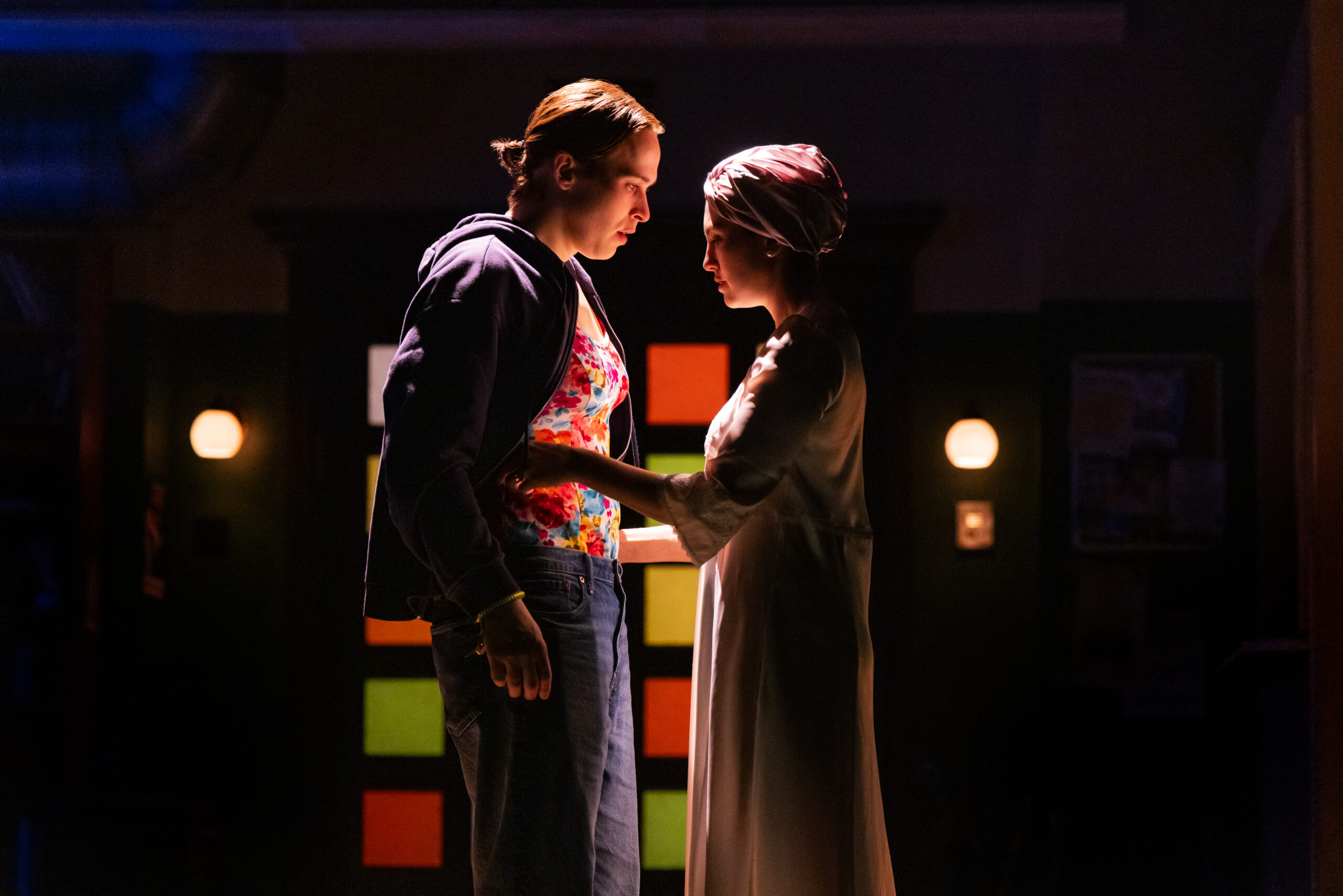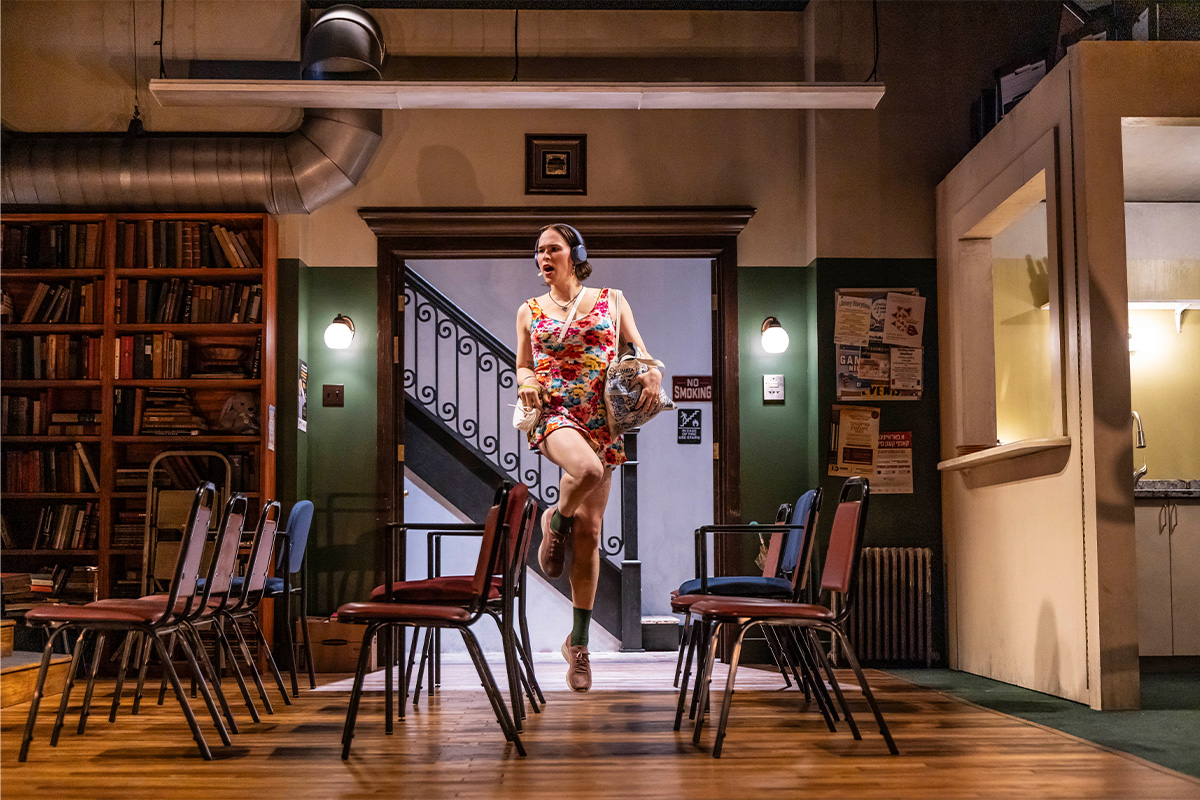In 2021, Jewish actress Tommy Dorfman reintroduced herself to the world. Previously, she had been launched into the spotlight for roles like Ryan Shaver on the Netflix hit “13 Reasons Why” and Max in Jeremy O. Harris’ play “Daddy.” But in conversation with “Detransition, Baby” author Torrey Peters in Time Magazine that year, Dorfman publicly announced her transition. It wasn’t so much a coming out, she said. She wasn’t changing her name, nor had her identity really shifted. Rather, living publicly as a trans woman was a clarification of who she already was. “I’m becoming more Tommy,” she said at the time.
Following that interview, Dorfman took a bit of a hiatus from acting. There were personal reasons behind the decision, as well as jobs that didn’t align for her. But finally, she’s in her “earning years,” as she puts it to me when we chat on the phone on a sunny afternoon in late March. The experience, creative energy and excitement she’s earned has translated into playing Tybalt and the Nurse in the Broadway production of “Romeo + Juliet,” starring opposite Rachel Zegler and Kit Connor this past fall. And since March, Tommy is starring in a play by Emil Weinstein at the New York Theater Workshop. In it, she plays a 20-something descendant of the Baal Shem Tov named Chava who has recently left the Hasidic Williamsburg community to live as a trans woman.
The show, perhaps auspiciously, is called “Becoming Eve.”
“Becoming Eve,” which is based upon the 2019 memoir of Rabbi Abby Chava Stein, is grounded in a meeting between three rabbis just before the High Holidays. Chava has called the meeting and with the support of her friend, a progressive rabbi named Jonah (Brandon Uranowitz), she plans to use a little-known interpretation of the Akedah (the binding of Isaac) to come out to another rabbi: her Tati (Richard Schiff). I don’t think it’s a spoiler to say the conversation doesn’t go well — Stein has been publicly living outside of the Hasidic community since 2015. After Tati’s initial concern for Chava subsides (the pair haven’t seen one another in 10 months), his reaction to the news swings from fierce anger to despair to shame to a resolve to shut Chava out of his life and cut her off from the rest of her family and community. Throughout, the audience is shot back and forth in time, seeing memories from Chava’s childhood, teenage yeshiva years and marriage played out by puppets and puppeteers with Tommy Dorfman’s voice to represent a pre-transition Chava.
When Tommy first read the script, she describes experiencing “a tingly feeling,” a magnetism towards Weinstein’s poetic writing that made taking on this role a no-brainer. “To me, it was unlike any character that I’d ever had the option to play, and it was a story that I’d never seen before on screen or on film,” Tommy says reverently.
Baruch Hashem for that. Tommy is a marvel as Chava. Her performance is simultaneously deeply moving, impressively human in her collaboration with the puppeteers and frankly uncanny in its resemblance to the real-life Abby Chava Stein, whose effervescent personality, seemingly unending well of knowledge and mile-a-minute pace I’ve had the opportunity to observe firsthand after she became the interim rabbi at my synagogue last year. Even more impressively, Tommy didn’t have that much time to prepare. She began rehearsals for “Becoming Eve” while “Romeo + Juliet” was still on Broadway, only meeting with her acting coach Julia Crockett once before diving into the role.
It’s from this one session that Crockett suggested an unusual rehearsal tool: a metronome. While spending time with Stein during rehearsals, studying how she holds herself and noticing their shared propensity for tapping their forehands while thinking and gesticulating while speaking, Tommy also timed the rabbi. Her discovery? Stein speaks at 123 beats per minute. (For reference, that’s the BPM of the song “Please Don’t Stop the Music” by Rihanna.) As Tommy calls herself “a bit of a slower BPM person” she tells me that she practiced reading the script at that pace to perfect Stein’s cadence.
Tommy is careful to tell me that despite using Stein as a touchstone for Chava, they are not the same person. “I was liberated from having to create a carbon copy of her really early on,” she says. “There’s a reason that they chose to name the character Chava. It’s important for her to also have some distance from the creative liberties that the play takes on.” In preparation for playing younger versions of Chava, she also did age and movement work and pulled on her experience as an aunt to multiple young nieces and nephews. Still, Stein also took Tommy on a tour of Williamsburg. Together, they visited sites of Stein’s Hasidic childhood. It made the stakes of the play viscerally real for her, Tommy says. It gave her the context to inhabit a world she had been walking and biking through since she moved to New York to attend Fordham University in 2011 — and, incidentally, it also gave her some kosher knock-off Pop Rocks she picked up at a grocery store in the neighborhood.

But how much of Tommy herself is in Chava? The comparisons are easy to make: Tommy and Chava are both trans Jewish women dealing with or having dealt with coming out. “There’s an emotional truth and resonance in wanting to be seen and heard and loved and respected, and wanting to find a common ground with adversaries, at times. Or not adversaries, but with family who can become heated, if you will, in a way that I also could relate to,” Tommy says.
“I think something about the play that I love is that it is a bit of an investigation of Chava’s life. The memories are there to fortify her in the present, but also, at times, derail her,” she says. “I really relate to that quality. Like I often find myself kind of getting shot back in memories of my life, and especially early in my transition, I was doing a lot of investigative work on like, why did it take so long for this to happen? How did I get to this place? Where was my family? Where are they now? There were a lot of those questions that came up.”
Of course, on a base level, their experiences are vastly different. Tommy grew up in a more culturally Jewish household in Georgia — her father’s family moved from Brooklyn to Atlanta in the ’50s — and witnessed the complexities of transphobia, queerphobia and antisemitism in the South. They celebrated the High Holidays, but there wasn’t a lot of talk of God in her house. Funnily enough, Tommy says her parents are more spiritual now than they were then and in some ways, she is too. “I had a lot of trouble in my teens and 20s, and turned to asking a lot of questions about God and spirituality and trying to find an understanding of existing in the world that I was living in, like needing to find comfort and solution and trust and faith in a power greater than myself,” she says.
Part of that new spirituality, or at least more acquired knowledge of Judaism comes from doing this play. “For me, [faith] is a really personal journey. I think the more that I get to learn about Kabbalah outside of the pop culture tabloid version of it and the mysticism in Judaism, the more Jewish [I feel]. I approach my spirituality from a more mystical space. And so that feels really affirming,” she says.
In turn, it’s deeply affirming as an audience member to see this particular story in a moment where the Trump administration has begun to take away the rights of the transgender community and erase their stories. And sadly, “Becoming Eve” itself hasn’t been immune to this discrimination. Initially, the show was supposed to be put on at The Connelly Theater, an Off-Broadway venue in the East Village which has long put on cutting edge and provocative shows like the play “Circle Jerk” and Kate Berlant‘s one woman show “Kate.” However, in October of 2024, the landlord of The Connelly, who happens to be the Roman Catholic Archdiocese of New York, rejected the script for the “Becoming Eve.” The move left the NYTW scrambling to find a new theater. They found it in the Abrons Art Center, whose theater serendipitously housed Yiddish theater in the early 20th century.
While Tommy admits that it is “interesting” being publicly trans right now, ultimately she says it feels good to be telling a trans Jewish story. “I love being able to use my art as a vessel for what I believe,” she says, explaining that she feels less comfortable on a soapbox and more comfortable advocating through art. “We should be fighting for our rights and fighting for our freedoms and liberation for not just ourselves, but for diaspora communities,” she says. “So I think for me to get to do that within my art is a real gift.”
Roles like Chava, with her complexity, authenticity and with the challenge and timeliness, feel like what Tommy has been meant for all along. I don’t want to speak for her, but from the way she talks about the show over the course of our conversation, it feels like a validation of her journey of “becoming more Tommy.”
What Tommy does mention, though, is that what she’ll be taking away from her experience in “Becoming Eve” is complex. In the short term, it could be a bat mitzvah — she tells me, laughing, that Stein has offered to facilitate one for her and that maybe she’ll take her up on the offer. But farther down the road, she’s not quite sure how the show will imprint itself on her life yet, only that come May, when “Becoming Eve” closes and she’s onto her next project (the release of her memoir), she’ll have time to process. “I’m really trying to remain kind of just present in the work that we’re doing right now,” she says. “But I’ve found with any job, especially something that’s this intense and this visceral and present and complex, the reverberations will be lifelong.”

This sentiment is an ending and a beginning not unlike the one held by the play itself.
In the final moments of “Becoming Eve,” Tommy is center stage. She has been for the majority of the show, two hours of rabbinical debate and jumping back-and-forth between the present and Chava’s memories all the while collaborating with puppets and puppeteer. It’s seemingly exhausting work, especially paired with a story where there is no concrete resolution.
But in the last scene, Tommy and Chava, too, can finally breath. Tommy dances, swaying and jumping to the beat of a stage transformed into a smoky Bronx nightclub. To her right, Jonah is chanting from the Akedah in the sanctuary of his tiny uptown synagogue. And to her left, Tati is wrapping tefillin and reciting morning blessings in his kitchen back in Williamsburg. All three rabbis. All three finding God.
“That’s the moment in which Chava and I are maybe the closest to each other as people,” Tommy tells me. “But, in that moment, I’m also just enjoying the release of the world of the play.”
It’s a euphoric release. The final words of the play ring out and they come from the Torah: “Hineni,” Jonah leyns. I am here. For the first time in “Becoming Eve,” Chava is liberated. She has arrived as herself.
And now, Hineni. It feels like Tommy Dorfman has arrived, too.



